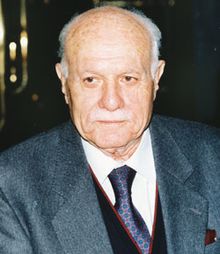Ihsan Abbas
| Ihsan Abbas | |
|---|---|
 |
|
| Born |
December 2, 1920 Ayn Ghazal, Mandatory Palestine |
| Died | January 29, 2003 (aged 82) Amman, Jordan |
| Awards | King Faisal International Prize |
| Academic background | |
| Alma mater | |
| Influences | Ibn Hazm, Kahlil Gibran |
| Academic work | |
| Main interests | Arabic literature, Islamic jurisprudence |
Ihsan Abbas (December 2, 1920 – January 29, 2003) was a Palestinian professor at the American University of Beirut, and was considered a premier figure of Arabic and Islamic studies in the East and West during the 20th century. During his career, Abbas was renowned as one of the foremost scholars of Arabic language and literature and was a respected literary critic. Upon his death, Abbas was eulogized by University College London historian Lawrence Conrad as a custodian of Arabic heritage and culture, and a figure whose scholarship had dominated the Middle East's intellectual and cultural life for decades.
Abbas was born in the former Palestinain village of Ayn Ghazal near Haifa on December 2, 1920, though the village's population was forced to leave in 1948 at the time of the 1948 War, and was subsequently destroyed during Operation Shoter. As a child, the only books in his family's impoverished home were the Qur'an and a famous 15th-century Arabic encyclopedia known as Al-Mustatraf; Abbas would often sadden at the mention of the latter due to the memories it brought him. Growing up in Palestine, Abbas completed high school in Haifa and Acre before attending the Arab College in Jerusalem from 1937 to 1941. Abbas then spent the next four years teaching at a college in Safed and went on to earn a Bachelor of Arts degree in Arabic literature from Cairo University in 1950; for the next ten years, Abbas traveled between his study at Cairo where he earned a Master of Arts and Doctor of Philosophy, and his work at Gordon Memorial College or, as it became known during his tenure, the University of Khartoum. Abbas' master's thesis focused on Arabic literary culture in Sicily, while his doctoral dissertation was on the subject of religious asceticism and its influence in Umayyad culture. At the end of his tenure in Sudan, he was appointed to a professorship position in the Arabic literature department at the American University of Beirut, a post which he held until his retirement in 1985. Abbas remained active, performing post-retirement research projects for the University of Jordan, especially on Andalusian Arabic literature and the translation of world literature to the Arabic language.
...
Wikipedia
